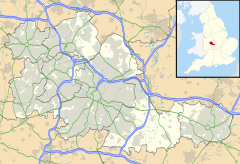Coseley
| Coseley | |
|---|---|
 Castle Street, Coseley, in 2008 |
|
| Coseley shown within the West Midlands | |
| Population | 12,357 (2011.ward) |
| Metropolitan borough | |
| Metropolitan county | |
| Region | |
| Country | England |
| Sovereign state | United Kingdom |
| Post town | BILSTON |
| Postcode district | WV14 |
| Post town | TIPTON |
| Postcode district | DY4 |
| Dialling code | 01902, 0121, 01384 |
| Police | West Midlands |
| Fire | West Midlands |
| Ambulance | West Midlands |
| EU Parliament | West Midlands |
| UK Parliament | |
Coseley is a suburban area in the north of the Dudley Metropolitan Borough, in the English West Midlands. Part of the Black Country, it is situated approximately three miles north of Dudley itself, on the border with Wolverhampton. Though it is a part of Dudley for statistical and administrative purposes, it is divided between the Bilston and Tipton postal districts, and mostly falls within the Wolverhampton South-East parliamentary constituency.
Coseley railway station is on the West Coast Main Line, and is operated by London Midland.
Coseley was originally a village in the ancient manor of Sedgley. In 1867, it joined with Brierley and Ettingshall to break away from the parish of Sedgley and formed Lower Sedgley Local Board District. In 1875, the name was changed to Coseley Local Board District by order of the Council and, in 1895, became Coseley Urban District. At this stage, most of the Coseley area was occupied by industrial and agricultural land; it was known during this time for its Carboniferous fossils.
Coseley Urban District Council built several thousand council houses and flats over a 40-year period from the mid-1920s which changed the face of the area. Most of these were built around Woodcross, Lanesfield, Wallbrook, and Brierley.
Coseley gained a cinema, on the corner of Mason Street and Birmingham New Road, during the 1930s, part of the Clifton chain, but this closed in January 1963 as a result of the postwar decline in cinema audiences brought on by the rising popularity of home television. The building was later demolished and a veterinary surgery now occupies the site.
...
Wikipedia

